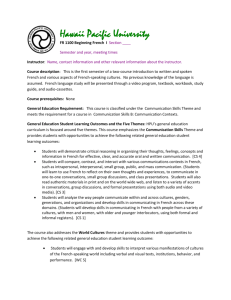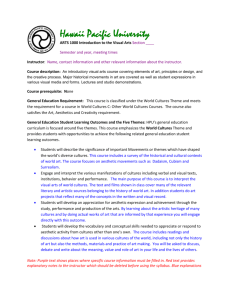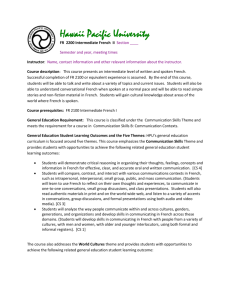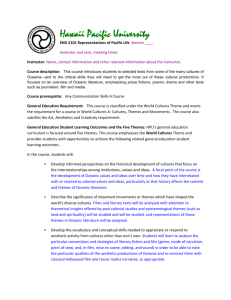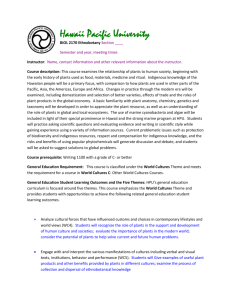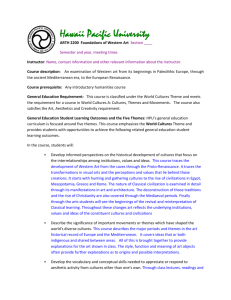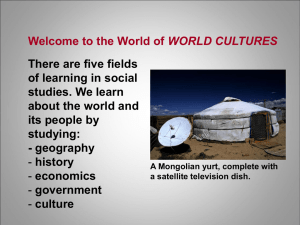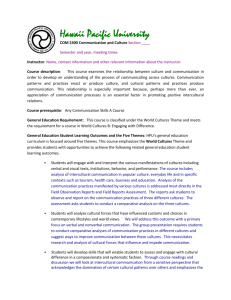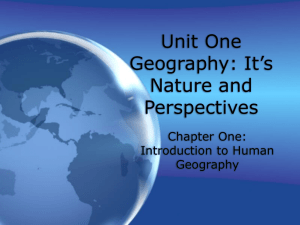Hawaii Pacific University
advertisement
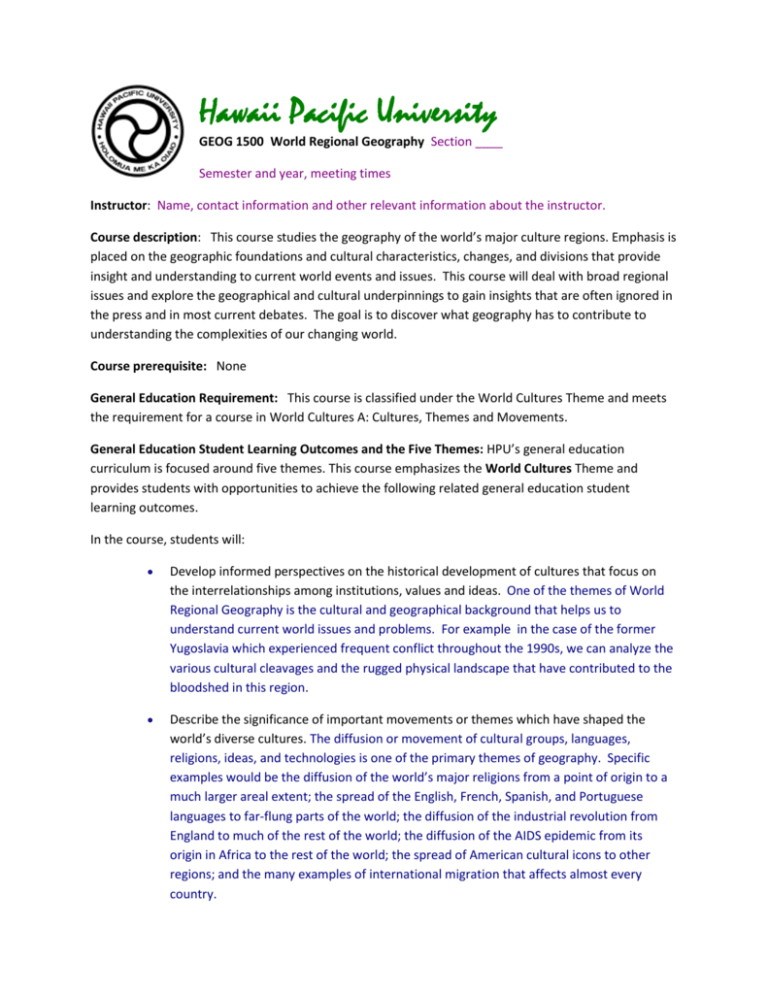
Hawaii Pacific University GEOG 1500 World Regional Geography Section ____ Semester and year, meeting times Instructor: Name, contact information and other relevant information about the instructor. Course description: This course studies the geography of the world’s major culture regions. Emphasis is placed on the geographic foundations and cultural characteristics, changes, and divisions that provide insight and understanding to current world events and issues. This course will deal with broad regional issues and explore the geographical and cultural underpinnings to gain insights that are often ignored in the press and in most current debates. The goal is to discover what geography has to contribute to understanding the complexities of our changing world. Course prerequisite: None General Education Requirement: This course is classified under the World Cultures Theme and meets the requirement for a course in World Cultures A: Cultures, Themes and Movements. General Education Student Learning Outcomes and the Five Themes: HPU’s general education curriculum is focused around five themes. This course emphasizes the World Cultures Theme and provides students with opportunities to achieve the following related general education student learning outcomes. In the course, students will: Develop informed perspectives on the historical development of cultures that focus on the interrelationships among institutions, values and ideas. One of the themes of World Regional Geography is the cultural and geographical background that helps us to understand current world issues and problems. For example in the case of the former Yugoslavia which experienced frequent conflict throughout the 1990s, we can analyze the various cultural cleavages and the rugged physical landscape that have contributed to the bloodshed in this region. Describe the significance of important movements or themes which have shaped the world’s diverse cultures. The diffusion or movement of cultural groups, languages, religions, ideas, and technologies is one of the primary themes of geography. Specific examples would be the diffusion of the world’s major religions from a point of origin to a much larger areal extent; the spread of the English, French, Spanish, and Portuguese languages to far-flung parts of the world; the diffusion of the industrial revolution from England to much of the rest of the world; the diffusion of the AIDS epidemic from its origin in Africa to the rest of the world; the spread of American cultural icons to other regions; and the many examples of international migration that affects almost every country. Investigate the roles that factors such as race, ethnicity, class, power, belief systems, or gender play in past and present cultural systems. The roots of many regional conflicts can be traced to geographic distributions and inequalities regarding race, ethnicity, power, religion, and sometimes gender. Engage with and interpret the various manifestations of cultures including verbal or visual texts, institutions, behavior, or performance. The cultural landscape represents a visual (and sometimes verbal) text that can be read and interpreted. Geographers define the term “cultural landscape” as how humans have shaped the natural landscape to create a built environment. The cultural landscape contains deep meanings and it can provide a window into the various manifestations of cultures and represents one of the richest intellectual traditions within the field of geography. Note: Purple text shows places where specific course information must be filled in. Red text contains explanatory notes to the instructor which should be deleted before using the syllabus. Blue explanations above should be rephrased by the individual instructor to reflect the specific approach in that section of the course. Course-specific outcomes below are an example and may be rephrased or modified by the instructor. Course-Specific Student Learning Outcomes for GEOG 1500 World Regional Geography Students will 1. Understand the historical development of major world cultures. Students will learn how the major cultures and cultural regions of the world came to be how they are today. 2. Explain how the movements of peoples and cultures have created the world we live in today. Students will learn how the world is a dynamic place where peoples and their cultures are continuously on the move. They will learn how diffusion of peoples, their languages, religions, ideas, and technologies have created the world as we know it today. 3. Investigate the racial, ethnic, economic, political, linguistic, religious, and gender diversities shape the nature of regions and states throughout the world. Students will learn how virtually all political states have diversities that shape their current cultural environment and help us to understand the problems and issues facing these regions/states. 4. Use the cultural landscape as a visual text that provides a window to the political, economic, and cultural realities of a place. Students will learn how geographers read the cultural landscape in much the same way that we might read a book. The cultural landscape is a visual text that provides a window into the political, economic, and cultural history and characteristics of a place. 5. Use geography as a foundation that provides insights on the causes and progression of major world and regional issues. Students will learn how geography provides an essential background that helps us to understand issues and problems at global and regional scales. Complex issues become much more understandable with a strong geographic knowledge of the underlying cultural realities. For the rest of these required syllabus items see the details in the faculty handbook. Delete this note once the syllabus is complete. For online courses there are some additional requirements given at this link. Texts List textbooks with ISBN’s and include this language as well All textbook information (pricing, ISBN #, and e-books) for this course can be found on the HPU Bookstore website: hpu.edu/bookstore. If you have any questions regarding textbooks, please contact the HPU Bookstore at: Phone: 808-544-9347 Or e-mail: jyokota@hpu.edu mmiyahira@hpu.edu Assignments and mode of evaluation Summary of important dates and deadlines (if the schedule is a separate document and due dates are not given with the description of the assignments). Class rules and policies (including regarding attendance, late work and academic dishonesty) Schedule of events (may be attached separately)
